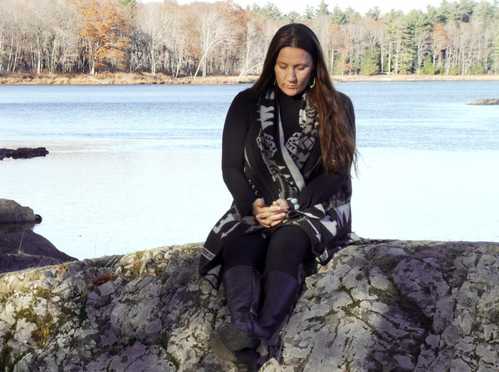Category: People, Native Americans
Item 7330
Indian Raid on Casco Bay, 1676
Contributed by: Maine Historical Society Date: 1676-09-13 Location: Portland Media: Ink on paper
Item 9213
Derivations of the name Peter Paul within the Abenaki community, 1960
Contributed by: Maine Historical Society Date: 1960-06-13 Location: Woodstock Media: Ink on paper
Exhibit
When Europeans arrived in North America and disrupted traditional Native American patterns of life, they also offered other opportunities: trade goods for furs. The fur trade had mixed results for the Wabanaki.
Exhibit
Creation and other cultural tales are important to framing a culture's beliefs and values -- and passing those on. The Wabanaki -- Maliseet, Micmac, Passamaquoddy and Penobscot -- Indians of Maine and Nova Scotia tell stories of a cultural hero/creator, a giant who lived among them and who promised to return.
Story
Waponahki Rematriation
by Sherri Mitchell Weh’na Ha’mu Kkwasset
Women's leadership in Wabanaki communities
Story
A New Beginning for Wabanaki Land Relationships
by John Banks
Wabanaki leadership in land stewardship
Lesson Plan
Maine's Acadian Community: "Evangeline," Le Grand Dérangement, and Cultural Survival
Grade Level: 9-12
Content Area: English Language Arts, Social Studies
This lesson plan will introduce students to the history of the forced expulsion of thousands of people from Acadia, the Romantic look back at the tragedy in Henry Wadsworth Longfellow's famous epic poem Evangeline and the heroine's adoption as an Acadian cultural figure, and Maine's Acadian community today, along with their relations with Acadian New Brunswick and Nova Scotia residents and others in the Acadian Diaspora. Students will read and discuss primary documents, compare and contrast Le Grand Dérangement to other forced expulsions in Maine history and discuss the significance of cultural survival amidst hardships brought on by treaties, wars, and legislation.
Lesson Plan
Grade Level: 3-5, 6-8, 9-12
Content Area: Science & Engineering, Social Studies
This lesson plan will give middle and high school students a broad overview of the ash tree population in North America, the Emerald Ash Borer (EAB) threatening it, and the importance of the ash tree to the Wabanaki people in Maine. Students will look at Wabanaki oral histories as well as the geological/glacial beginnings of the region we now know as Maine for a general understanding of how the ash tree came to be a significant part of Wabanaki cultural history and environmental history in Maine. Students will compare national measures to combat the EAB to the Wabanaki-led Ash Task Force’s approaches in Maine, will discuss the benefits and challenges of biological control of invasive species, the concept of climigration, the concepts of Traditional Ecological Knowledge (TEK) and Indigenous Knowledge (IK) and how research scientists arrive at best practices for aiding the environment.













